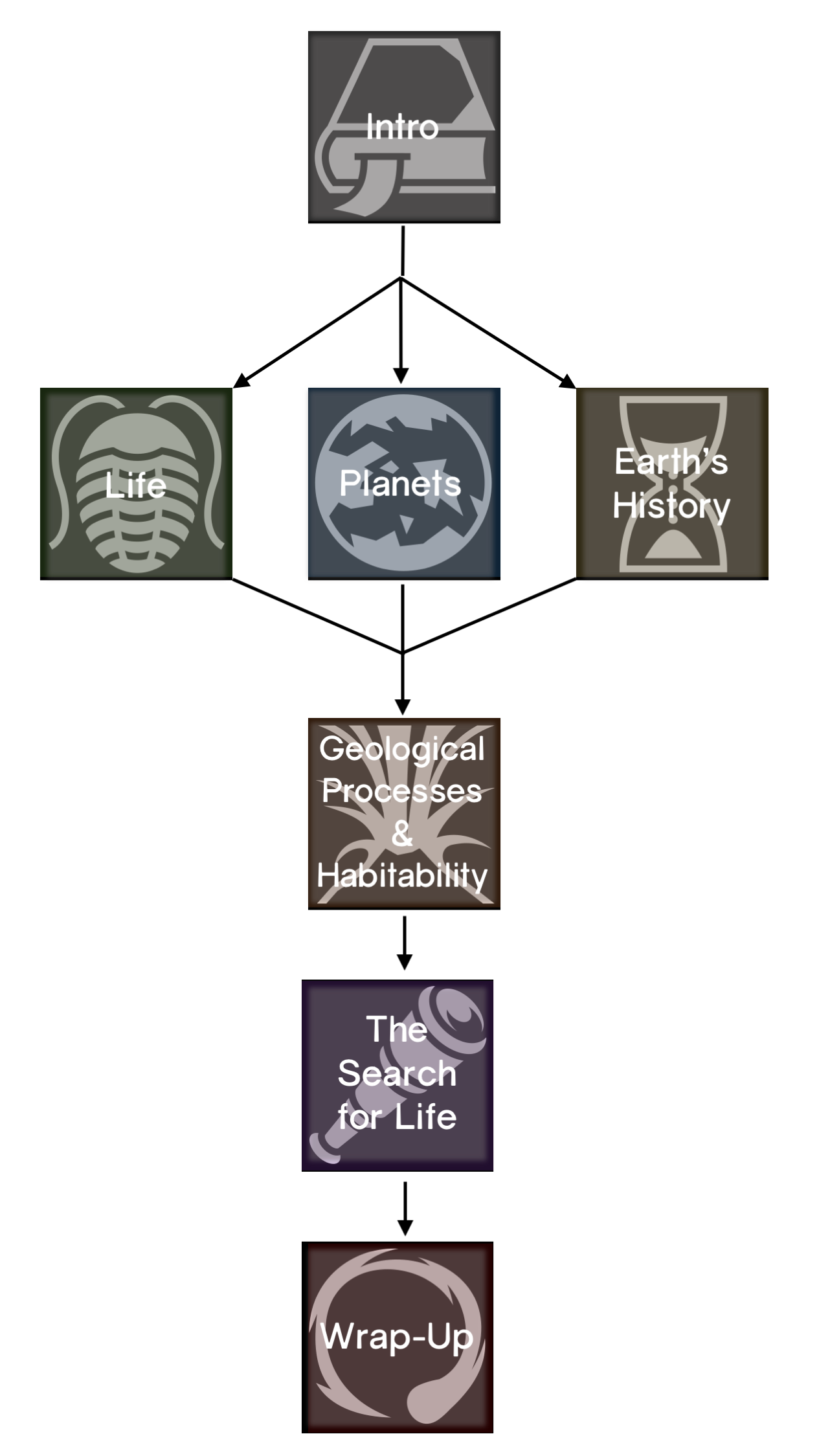Syllabus
Please take a moment to review this syllabus. It contains important information about due dates, grading, and academic honesty guidelines.

Images CC-BY Lorc on game-icons.net
Course Map
There are seven units in this course. You can see the course map to the right. We recommend that you start with the introduction, then work through the "Life," "Planets," and "Earth's History" sections in any order you want before moving on to "Geological Processes and Habitability," "The Search for Life," and, finally, the "Wrap-Up."
Grading
You will be graded on your performance on the questions in this course. These questions are spread throughout the course; there are no exams or quizzes.
Each problem - that is, each time you see the "Submit" box - is worth a number of points as indicated.
Some problems are designed to raise questions in your mind and get you curious about the course material. You should attempt to answer these questions correctly, but they are worth very few points (one or two each), so don't worry too much about them. You can still get an excellent score in the course even if you answer them all wrong.
Other questions are designed to test your understanding of the material in the course. These are found at the end of each section and are worth more: 5 to 20 points each depending on their difficulty and the length of time it should take to complete them. You will need to complete most of these correctly in order to do well in the course, though you will have more than one chance to answer each of these questions.
There are no due dates until the end of the course, which is listed on the homepage. You may complete the material at your own pace, as long as you finish by the end of the course.
Not all students will see the same questions, or see them in the same locations.
Certification
The passing grade for this course is 60%. You can find your current score on the Progress page. All subsections count equally for grading; the lowest score will be dropped. There is no final exam.
EdX provides certificates to those who have passed the course and verified their identity. If you achieve a passing grade in this course you are eligible for a Verified Certificate. Your certificate will indicate you have successfully completed the course, but will not include a specific grade.
You can find out more about self-paced courses and certification at the EdX Learner's Guide.
Guidelines for Collaboration
We encourage class participants to share their approach to problems! Such discussions can be useful for your classmates, and it's always useful to see more than one way to do a problem. All that we ask is that you please do not post solutions. The staff will be proactive in removing posts and replies in the discussion forum that have stepped over the line.
- It is ok to discuss the general approach to solving a problem.
- You can work jointly to come up with the overall approach or general steps for a solution.
- It is ok to get a hint, or several hints for that matter, if you get stuck while solving a problem.
- It is ok to have someone show you a few steps of a solution where you have been stuck for a while, provided of course, you have attempted to solve it yourself without success.
- You should work out the details of the solution yourself.
- It is not ok to take someone else's solution and simply copy the answers from their solution into your checkboxes.
- It is not ok to take someone else's formula and plug in your own numbers to get the answer.
- It is not ok to post answers to a problem.
- It is not ok to look at a full step-by-step solution to a problem.
After you have collaborated with others in generating a correct solution, a good test to see if you were engaged in acceptable collaboration is to make sure that you are able to do the problem on your own.
Diversity, Equity, and Inclusion
VPAL is committed to convening and nurturing a diverse community dedicated to promoting inclusive excellence and leadership in teaching and learning. We celebrate, welcome, and honor all backgrounds, cultures, races, identities, life experiences, perspectives, beliefs, and values. We strive to ensure that all feel included in our mission, our work, and our learning inside and outside our organization. We affirm that inclusivity and belonging are the foundations of excellence.
Honor code statement
HarvardX requires individuals who enroll in its courses on edX to abide by the terms of the edX honor code. HarvardX will take appropriate corrective action in response to violations of the edX honor code, which may include dismissal from the HarvardX course; revocation of any certificates received for the HarvardX course; or other remedies as circumstances warrant. No refunds will be issued in the case of corrective action for such violations. Enrollees who are taking HarvardX courses as part of another program will also be governed by the academic policies of those programs.
Nondiscrimination/anti-harassment statement
Harvard University and HarvardX are committed to maintaining a safe and healthy educational and work environment in which no member of the community is excluded from participation in, denied the benefits of, or subjected to discrimination or harassment in our program. All members of the HarvardX community are expected to abide by Harvard policies on nondiscrimination, including sexual harassment, and the edX Terms of Service. If you have any questions or concerns, please contact harvardx@harvard.edu and/or report your experience through the edX contact form.